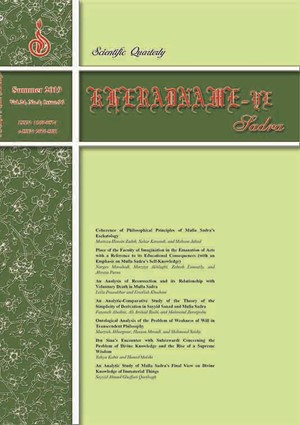Coherence of Philosophical Principles of Mulla Sadra’s Eschatology
Subject Areas :Morteza Hoseinzadeh 1 , Sahar Kavandi 2 , Mohsen Jahed 3
1 -
2 -
3 -
Keywords: Coherence eschatological principles consequences of principles corporeal resurrection Mulla Sadra ,
Abstract :
Demonstration of corporeal resurrection, as a philosophical problem, has always attracted the attention of Islamic philosophers. Through employing eschatological principles, Mulla Sadra has tried to demonstrate corporeal resurrection and explain the post-resurrection states in his own philosophical school. Discovering the coherence among eschatological principles and their consequences results in a more desirable clarification of Mulla Sadra’s theory of corporeal resurrection. While concentrating on eschatological principles and inferring their theoretical foundations, this study investigates the internal and external coherence of such principles and their consequences and proves that all eschatological principles and some of their consequences bear strong coherence (creating relation) in relation to each other, although some other consequences possess a weaker coherence. Moreover, some of the principles which play a fundamental role in the process of demonstrating corporeal resurrection, such as the union of the intellect and intelligible, corporeal origination and spiritual subsistence of the soul, and simplicity of being, have not been explicitly referred to as affirmative principles of resurrection. Not distinguishing among ontological and anthropological principles and not observing any priority or posteriority in setting the principles could count as the defects of Mulla Sadra’s demonstration of this important philosophical theory.
